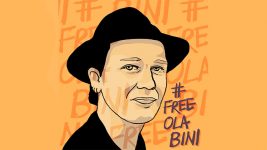Free Ola Bini: “Assange-Linked” Digital Rights Activist Arbitrarily Detained in Ecuador

Just hours after the Ecuadorian embassy in London threw Julian Assange to the lions on 11 April, the authorities in Ecuador arrested and detained free software developer and online privacy activist Ola Bini at Quito airport.
Despite local press in Ecuador implying that Mr Bini was trying to skip the country in the wake of Assange’s arrest, he was about to board a flight to Japan for a long planned two week jujitsu training trip that he’d tweeted about the day prior.
After initially being held without reason, the Swedish national was eventually marched into a court room 30 hours later and charged with “alleged participation in the crime of assault on the integrity of computer systems”.
The judge sentenced Bini to 90 days pre-trial detention. The US-aligned Ecuadorian government has released cooked allegations of his plotting against the president with two unidentified Russian hackers. As proof, police produced USBs, hard drives and technical manuals seized at his home.
But, Mr Bini’s supporters assert there’s absolutely no evidence that he’s caught up in any conspiracy against Lenin Moreno, and nor is he a hacker. And they state it’s his online privacy activism that has led to him being caught up in a political dispute that doesn’t even involve him.
An ominous precedent
“We still don’t know what Ola’s been arrested for: the charges filed are extremely vague,” explained Tom Sulston, a director at Digital Rights Watch. He added that his detention is to allow police time to search for evidence.
“Typically, this sort of detention is used for very serious crimes such as terrorism, which is why its use here is very worrying,” continued Sulston, who used to work with Bini and still counts his former colleague as a friend.
According to the software consultant, the implications of his arrest “are grave”, as he explains that the Ecuadorian prosecutor’s office has claimed the digital devices obtained at Bini’s home are “prima facie evidence of criminal activity”.
“This effectively means that anyone working on technology in Ecuador is under threat of three month’s arbitrary detention,” Sulston told Sydney Criminal Lawyers. He further stated that this isn’t only “extremely dangerous” for locals, but it sets a precedent for software developers globally.
Silencing online activists
The free software community around the world hold Mr Bini in high esteem. As Mr Sulston points out, his friend could have been working for a global tech giant, however he chose to pursue “working on open-source software for enhancing citizens’ ability to communicate privately”.
However, it’s this pursuit and his well-respected campaigning for the right to privacy that seems the likely reason why he’s been targeted by the Ecuadorian government, which was under pressure from another government as far as online whisperings are concerned.
Mr Bini has made major contributions in the field of digital security and encryption. The latter has long been a bane for the Five Eyes nations, which was recently evidenced in this country when the Liberal Nationals government passed the Assistance and Access Bill last December.
UK-based human rights organisation ARTICLE 19 said in a statement that it’s concerned that Bini’s arrest is “part of a crackdown against the community of developers who build digital security technology tools which enable Internet freedoms and secure communication online”.
Blatant rights violations
Ola Bini was a long-time supporter of WikiLeaks and had visited Assange at the embassy in London on a number of occasions, but unlike the Ecuadorian government is claiming, he’s not a WikiLeaks collaborator and neither is he close to the Australian journalist.
The 36-year-old Swedish software developer was unlawfully arrested at the airport in Quito. The Ecuadorian agents didn’t have an arrest warrant. Bini was denied access to his lawyers for 17 hours, he was not permitted a translator, and nor was he informed of any charges against him.
In violation of police protocol, Bini was held at the airport for eight hours. He was subsequently taken to his home where agents coaxed him into letting them in, so they could search the place. And he was then taken to a holding cell where he spent the night, without access to legal advice.
On the following day, Bini was transferred to the prosecutor’s office where he was held for a further 12 hours. Once his lawyers were permitted to attend, they report being harassed by police. And the presiding judge sentenced him to three months detention without a shred of substantial evidence.
Notes from a cell
Mr Bini has released a number of statements from within El Inca prison. “Without privacy, we can’t have agency, and without agency we are slaves,” he wrote on 17 April. “That’s why I have dedicated my life to this struggle. Surveillance is a threat to us all, we must stop it.”
The online activist further posited that world leaders are “waging a war against knowledge”. And he made clear that the case authorities have against him is “Orwellian” and linked to the books he’s read and the technology he has. He added the transgression he has made is “ThoughtCrime”.
Worldwide concern
On 23 April, Swedish newspaper Aftonbladet published an open letter to local prime minister Stefan Löfven, which was signed by over 100 intellectuals from around the globe, including Noam Chomsky, Arundhati Roy, Scott Ludlam and Tim Norton of Digital Rights Watch.
The letter calls on the Swedish government to take “immediate action” over Bini’s arbitrary detention. It further puts forth that he has never worked for WikiLeaks and that the allegations against him are “false and ludicrous”.
“It’s plain to see that governments around the world are using the extraordinary powers granted to them post-9/11 to suppress legitimate uses of technology to bring privacy to citizens and transparency to governments,” Mr Sulston concluded.
“This represents a considerable shift in the state/citizen power balance and not a welcome one.”







